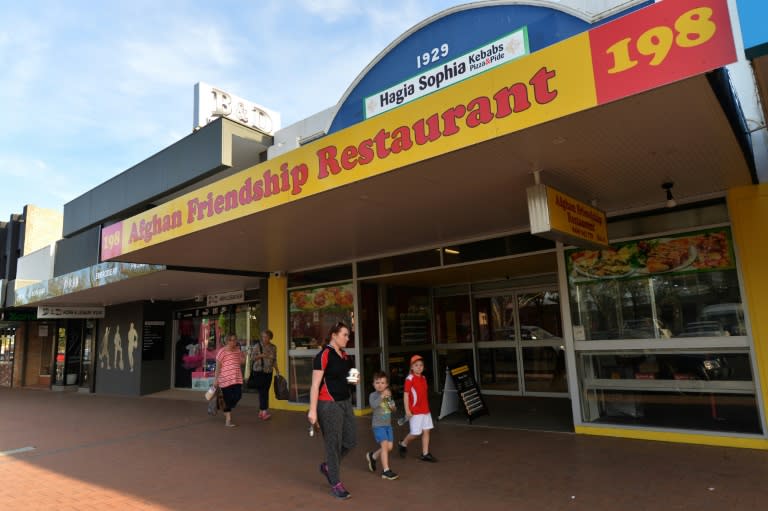From Afghanistan to the Outback: refugees ditch Australia's overcrowded cities
A Hazara refugee who now calls the Australian outback home, Ali named his new venture the "Afghan Friendship Restaurant", a tribute to the warm welcome he says he received after moving to the town of Griffith five years ago. The 44-year-old father of three is among a growing number of refugees and migrants to Australia who have opted to live in the bush rather than among the bright lights, hustle-bustle and astronomical prices of Sydney or Melbourne. The word "friendship" hovers over Ali's head in bright red lettering while he cooks lamb skewers, his face a picture of concentration as the rich wafts of fragrant smoke lure in hungry customers. It is the first-ever Afghan eatery in Griffith -- a six-hour drive west of Sydney -- and a far cry from the pie and chips staples of the Australian bush. "I suggest to all of my friends, especially Afghan people, to come to Griffith, because here's very friendly," Ali, who asked that his surname not be used to protect family still in Afghanistan, tells AFP during a break from cooking. "Also we can find a job as well, because the population is not too much." A nation of immigrants, nearly half of Australia's 25-million-strong population was either born overseas or has at least one parent born abroad. The country takes in around 14,000 refugees annually, with one-off exceptions to allow additional asylum-seekers, such as a recent scheme for 12,000 Syrians and Iraqis. But harsh anti-asylum policies against boat arrivals and high-profile incidents of racism have given the country a reputation as inhospitable to non-white immigrants. There's been a spike in anti-immigration sentiment, according to the Lowy Institute think tank, despite the overall intake of migrants -- capped annually at 190,000 -- remaining stable. Lowy's annual poll found that for the first time this year, more than half the Australians surveyed said the number of migrants was "too high" -- up from 40 percent in 2017. The poll's authors said the shifting attitudes could reflect a lurch to the right, particularly as conservative politicians call for intake cuts amid urban pressures. - 'Crying out for people' - Rapid demographic changes in Australian cities over the past decade have caused disquiet as residents grapple with congestion and high house prices. Yet at the same time many regional towns are "crying out for more people", according to population and cities minister Alan Tudge. His government is proposing that new arrivals live in smaller towns for a few years, in the hope they would make it their home. Critics say the policy is not enforceable, and add that migrants would struggle to integrate into rural populations amid language and cultural differences. But that is not what Jock Collins at the University of Technology Sydney, who is currently surveying 250 recently arrived families from Iraq, Syria and Afghanistan, has found. Collins says many migrants have positive feedback to share after being settled in smaller towns. In addition to job opportunities and a supportive environment -- "where the town goes out of its way to welcome refugees" -- the presence of other migrant communities can ease the transition, Collins says. "A lot of regional and rural towns are losing populations and in particular, the young people are leaving... so immigration can help fill that gap." Some immigrants also find it difficult to adjust to the busy rhythms of city life, making smaller towns an easier fit. Incentives like extended family visas -- which the conservative government has been cutting back on in favour of younger working-age migrants -- could also attract and keep refugees in the bush. - Crocodile Ali - One success story is Mingoola, a small rural township in New South Wales, on the border with Queensland, that was slowly dying as its population aged. Desperate for an injection of new blood, the town finally found a match with refugees from rural east Africa who were struggling in Sydney. Similar praise has been heaped on Nhill, a town four hours' drive from Melbourne that's boomed since local poultry firm Luv-a-Duck found a Karen community, a minority group persecuted in Myanmar, willing to move there. Eight years on, business is booming and the Karen now make up 10 percent of Nhill's 2,000-strong population. "From a position of decline, these towns are now thriving," says Jack Archer of the Regional Australia Institute, which is pushing for a national strategy instead of isolated efforts to match needy towns with job-seeking migrants. Back in Griffith, refugee entrepreneurs are boosting local jobs. Ali's restaurant employs another refugee and a migrant from Malaysia, while his wife also helps with the cooking. In more than one way, Ali is altering visitor flows between cities and rural towns. One couple have travelled from Sydney three times to eat at the restaurant. It's "for the soup", he says, "they like my soup and because of that they come here."




